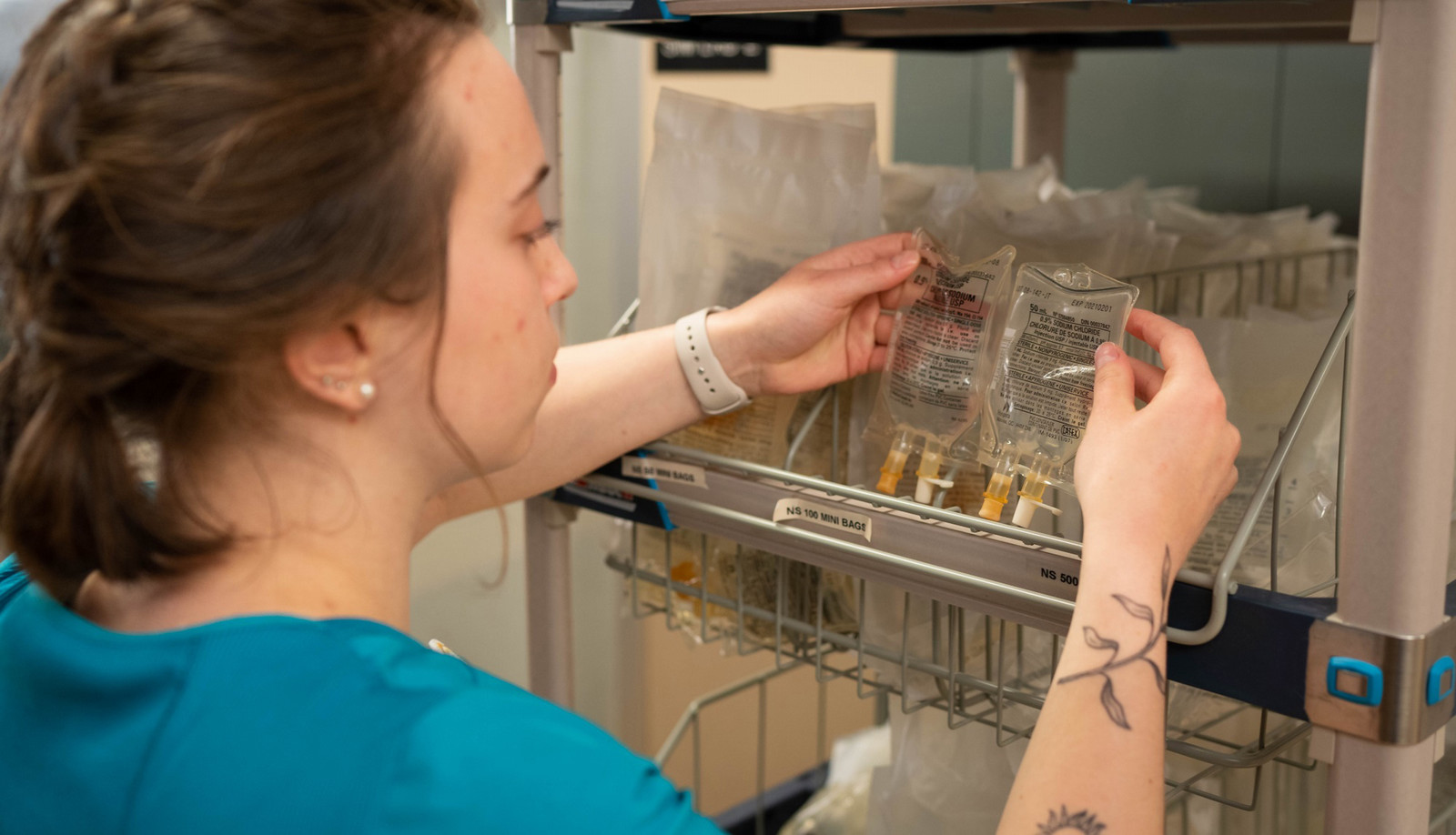
Saskatchewan Collaborative Bachelor of Science in Nursing (SCBScN) - RPN to BScN Pathway
Note: The first intake for this pathway will be in the Fall 2026 term. Application information will be available at a later date.
If you're a Registered Psychiatric Nurse (RPN) currently licensed in Saskatchewan through the Registered Psychiatric Nurses of Saskatchewan (RPNS), the RPN to BScN pathway can help you advance your nursing career.
Part of the four-year Saskatchewan Collaborative Bachelor of Science in Nursing (SCBScN) program, this pathway is offered in partnership by the University of Regina and Saskatchewan Polytechnic. It builds on your existing knowledge and experience and allows you to complete your Bachelor of Science in Nursing (BScN) in just two years of full-time study.
The SCBScN program, including the RPN to BScN pathway, is approved by the College of Registered Nurses of Saskatchewan (CRNS), the provincial licensing body for nurses. This ensures the program meets all provincial licensing requirements. It is also accredited by the Canadian Association of Schools of Nursing (CASN), meeting national standards for educational excellence.
This program takes a student-centered, practice-focused approach to learning. You’ll build on your experience through hands-on clinical placements, supported by expert faculty and state-of-the-art learning environments. With a blend of classroom instruction and real-world practice, you’ll develop the advanced skills and confidence needed to advance in your nursing career and work toward becoming a registered nurse.
After graduation, you’ll be eligible to write the National Council Licensure Examination (NCLEX-RN). Once you pass, you’ll be ready to expand the meaningful impact you already make in the lives of your clients and your community. Our graduates consistently achieve the highest NCLEX-RN pass rates in Saskatchewan and rank in the top third nationally.
Learn more about the Saskatchewan Collaborative Bachelor of Science in Nursing program at SaskNursingDegree.ca.
What Does Advancing to an RN Role Look Like?
After completing the two-year RPN to BScN pathway and successfully passing the NCLEX-RN, you’ll be eligible to register with the College of Registered Nurses of Saskatchewan (CRNS) and become a Registered Nurse (RN). As an RN, you'll take on expanded responsibilities that involve assessing patient needs, monitoring health and recovery, administering medications, assisting with medical procedures, and providing education and support to patients and their families.
Your advanced training in the SCBScN program will equip you with the knowledge and skills to confidently handle these key responsibilities. You’ll work alongside doctors, therapists, social workers, and other professionals to deliver holistic, effective care, improving health outcomes for your patients.
Quick Facts
Offered in Regina and Saskatoon
Connect with us
Nursing Meet Your Faculty
Why Study Nursing at the University of Regina?
Highest Success Rates
You’ll be well-prepared to pass your National Nursing Licensing Exam (NCLEX-RN). Our program has the highest pass rates in Saskatchewan and ranks in the top third in the country.Expert Faculty
Learn from experienced faculty who are leaders in the nursing profession. Their clinical skills and expertise span a wide range of interests, including care for vulnerable populations, Medical Assistance in Dying, virtual reality in healthcare, Indigenous health, breastfeeding and pediatric care, obstetrics, and healthcare ethics.Hands-on Learning
You’ll work directly with patients and clients, gaining hands-on experience that truly makes a difference. You’ll also build your skills through cutting-edge simulation labs, virtual reality, and immersive practice settings within the Health Authority and the wider community.Enhance Your Career
With approximately 98% of graduates securing employment as registered nurses within six months of completing the program, you’ll take on expanded responsibilities and gain the flexibility to work across diverse healthcare settings. As a Registered Nurse, you’ll have the opportunity to work in areas like critical care, pediatrics, emergency medicine, oncology, the operating room, mental health and addictions, community health, and home care—each offering its own unique challenges and rewarding experiences.RPN to BScN Pathway Frequently Asked Questions
Scholarships and Awards:
- SCBScN students can apply for scholarships, bursaries and awards from the University of Regina, Saskatchewan Polytechnic, and external agencies to help with their studies.
Financial aid:
- Canadian citizens, permanent residents, and designated protected persons may qualify for Canada Student Financial Aid, which provides loans and grants to help cover education costs.
- International students on a study permit should explore financial aid options available in their home country or consider loan opportunities through local banks.
The College of Registered Nurses of Saskatchewan (CRNS), the provincial licensing body for nurses, has approved the SCBScN program. Upon graduation, you’ll be eligible to be recommended to write the National Council Licensure Examination (NCLEX-RN) administered by the CRNS. To become a Registered Nurse (RN) and obtain registration with the CRNS, you must pass the NCLEX-RN exam, which tests the competencies you learned throughout the SCBScN program.
The SCBScN program is also accredited by the Canadian Association of Schools of Nursing (CASN), which is responsible for accrediting nursing programs across Canada. While the CRNS approval ensures the program meets provincial licensing requirements, CASN accreditation confirms that the SCBScN program meets national standards of educational excellence. Learn more about Professional licensing.
What Can You Do With a Nursing Degree?
As a Registered Psychiatric Nurse, you bring valuable skills and experience to the healthcare field. The RPN to BScN pathway offers you the opportunity to broaden your qualifications and grow your nursing career. Through this pathway, you’ll complete the Saskatchewan Collaborative Bachelor of Science in Nursing program and earn your Bachelor of Science in Nursing degree. After graduation, you'll be eligible to write the NCLEX-RN and become a licensed registered nurse.
With strong demand for graduates, you’ll be well-positioned to work in a variety of healthcare environments, including:
- Hospitals
- Medical clinics
- Nursing homes
- Community health departments
- Schools
- Correctional facilities
- Youth service organizations
- First Nation and Inuit health organizations
- Primary and population health services
Related Programs
